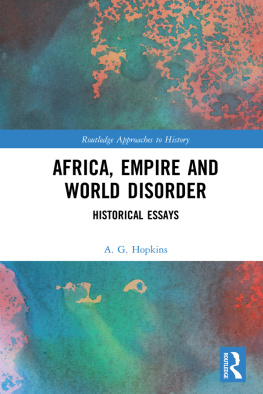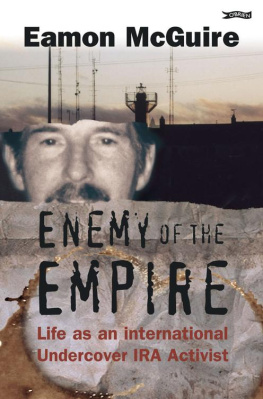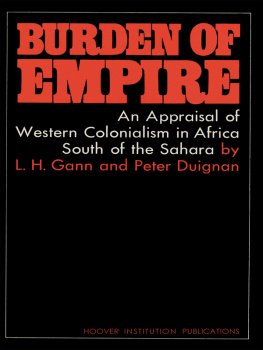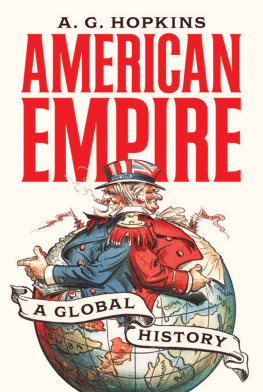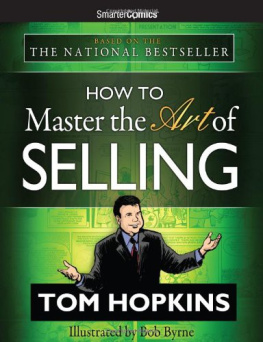Africa, Empire and World Disorder
This volume brings together important articles from the Cambridge historian A. G. Hopkins and reflect the enlargement and evolution of historical studies during the last half century. The essays cover four of the principal historiographical developments of the period: the extraordinary revolution that has led to the writing of non-Western indigenous history; the revitalisation of new types of imperial history; the now ubiquitous engagement with global history, including a reinterpretation of American Empire; and the current revival of economic history after several decades of neglect.
A. G. Hopkins is a British historian and currently Emeritus Smuts Professor of Commonwealth History at the University of Cambridge. He has written extensively on the economic history of Africa, European colonialism, American Empire, and globalisation.
Routledge Approaches to History
Historia Ludens
The Playing Historian
Edited by Alexander von Lnen, Katherine J. Lewis, Benjamin Litherland and Pat Cullum
The Aesthetics of History
Alun Munslow
Public Uses of Human Remains and Relics in History
Edited by Silvia Cavicchioli and Luigi Provero
The Enlightenment and the Fate of Knowledge
Martin L. Davies
Information and Power in History
Towards a Global Approach
Edited by Ida Nijenhuis, Marijke van Faassen, Ronald Sluijter, Joris Gijsenbergh and Wim de Jong
In Praise of Historical Anthropology
Perspectives, Methods, and Applications to the Study of Power and Colonialism
Alexandre Coello de la Rosa and Josep Llus Mateo Dieste
Far-Right Revisionism and the End of History
Alt/Histories
Edited by Louie Dean Valencia-Garca
Africa, Empire and World Disorder
Historical Essays
A. G. Hopkins
For more information about this series, please visit: www.routledge.com/Routledge-Approaches-to-History/book-series/RSHISTHRY
First published 2021
by Routledge
2 Park Square, Milton Park, Abingdon, Oxon OX14 4RN
and by Routledge
52 Vanderbilt Avenue, New York, NY 10017
Routledge is an imprint of the Taylor & Francis Group, an informa business
2021 A. G. Hopkins
The right of A. G. Hopkins to be identified as author of this work has been asserted by him in accordance with sections 77 and 78 of the Copyright, Designs and Patents Act 1988.
All rights reserved. No part of this book may be reprinted or reproduced or utilised in any form or by any electronic, mechanical, or other means, now known or hereafter invented, including photocopying and recording, or in any information storage or retrieval system, without permission in writing from the publishers.
Trademark notice: Product or corporate names may be trademarks or registered trademarks, and are used only for identification and explanation without intent to infringe.
British Library Cataloguing-in-Publication Data
A catalogue record for this book is available from the British Library
Library of Congress Cataloging-in-Publication Data
A catalog record for this book has been requested
ISBN: 978-0-367-45946-8 (hbk)
ISBN: 978-1-003-02618-1 (ebk)
Typeset in Bembo
by Apex CoVantage, LLC
Contents
PART I
Into Africa
(History, 54, 1969)
(Economic History Review, 21, 1968)
(in Roy Bridges, ed. Imperialism, Decolonisation and Africa: Historical Essays in Honour of John Hargreaves, 2000)
(Past & Present, 35, 1966)
(Journal of African History, 7, 1966)
(Journal of African History, 50, 2009)
(Economic History of Developing Regions, 34, 2019)
PART II
On to imperialism and empire
(in Robin Law, ed. From Slave Trade to Legitimate Commerce: The Commercial Transition in Nineteenth-Century West Africa, 1995)
(Journal of African History, 27, 1986)
(in Peter Clarke and Clive Trebilcock, eds. Understanding Decline: Perceptions and Realities; Essays in Honour of Barry Supple 1997)
(Past & Present, 200, 2008)
PART III
Towards disorder in the wider world
(Journal of Imperial & Commonwealth History, 45, 2017)
(in A. G. Hopkins, ed. Globalization in World History, 2002)
(Journal of Imperial & Commonwealth History, 35, 2007)
(Current History, 105, 2006)
Guide
At the outset of my career, sixty years ago, as much academic kudos was attached to publishing articles as it was to producing books. That, at least, was the case in historical studies as practised in Britain at the time. Articles in learned journals, so it was said, carried the key ideas; books appeared later and contained more detail than most readers needed. By the end of the last century, all this had changed. Books had taken precedence; articles had lost ground. Books conferred name recognition and boosted publicity in ways that articles did not. They suited the new metrics that measured scholarly output by quantity rather than by quality. Above all, they had become essential for promotion: the two book rule, which mandated one book for tenure and a second for promotion, had established itself as the preferred test for professional advancement. The formula originated in the United States but has now spread, with variations, to other countries.
Journals of history continue to proliferate and to publish admirable work. But their character has evolved with the times. The trend is for them to become testing grounds for younger scholars who are preparing to publish books; senior scholars do not feature as frequently as they once did; fewer debates occur in their pages. The disincentives are evident: articles can be refereed with greater rigour than books can; it can take as long to publish an article as a book and sometimes even longer.
Elements of the tradition that shaped my career are represented in these pages. Readers will be relieved to know that the fifteen essays reproduced here are only a small proportion of my output. The selection has been chosen not to advertise my subjective evaluation of their presumed merits, but to illustrate my interests and their relation to wider developments in the study of history. Perhaps the greatest attribute of the essay form is that it enables a writer to range widely over time and space. My own interests, as will become apparent, are spread over the last three centuries and include African history, imperial history, globalisation, and the United States. The medium has assisted the message: research for articles has allowed me to publish in diverse fields of history and has enhanced my knowledge of subjects that would have eluded me had I confined myself to writing fewer, longer studies.
The relationship between the essays that follow and trends in historical studies is discussed in the Introduction. The message that I hope emerges from considering the collection as a totality is the value to research students of understanding how the discipline has evolved. An awareness of historiography helps authors to find their place in the subject and from there begin to make their own distinctive contributions to it.
Accordingly, the chapters that follow appear in their original form to avoid obscuring the dates, and hence the circumstances, of their composition. Only minor changes have been made to correct printing errors and improve some infelicities of style that might have clouded their intended meaning. Readers may also stumble occasionally over terms that are now considered to be anachronisms but were formerly approved, the most obvious being references to Britain as she and her. The eagle-eyed reader will see that the presentation of citations is not uniform throughout the text because conventions vary between publishers. I hope, however, that the conventions are consistent within each chapter and will enable readers to trace references to their source without difficulty.

